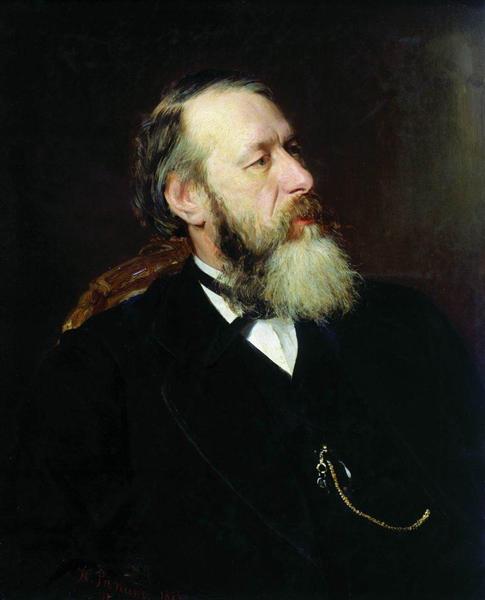תיאור
The Portrait of Vladimir Stasov, painted by Ilya Repin in 1873, offers a profound exploration of the character and importance of the figure of the art critic in the Russia of his time. Stasov, known not only for his work as a critic but also for his influence on the development of Russian art and his promotion of contemporary artists, is presented in this work with a seriousness and dignity that the painting manages to capture with remarkable precision.
In the composition, Repin opts for a direct, frontal approach, placing Stasov at the centre of the canvas. The critic’s upright posture and resolute gaze establish an immediate bond with the viewer, suggesting not only his self-assertion as an authority figure in the art world, but also his deep connection to it. The way Stasov stands in the painting, with his arms folded in his lap and a slight bow of his head, denotes a reflective, contemplative air, which is emblematic of his analytical role.
The use of colour in this work is particularly significant. Repin uses a palette of dark tones, predominantly browns and greys, which serve to emphasise the sobriety of Stasov's figure and at the same time create a strong contrast with the light touches of light that illuminate his face and jacket. This play of light and shadow not only highlights the critic's features, but also reflects the duality of art: between aesthetic appreciation and passionate criticism that defines Stasov's work.
The texture of the fabric and the details of the costume are another example of Repin's virtuosity. The meticulous rendering of Stasov's clothing, including details such as the fabric of the jacket and the naturally falling folds, contributes to the sense of palpable realism that characterizes much of Repin's work. Through these choices, the artist not only reveals the character of the sitter, but also invites the viewer to meditate on the role of the critic in the cultural fabric of society.
This portrait is a testament to Repin’s admiration for Stasov and, at the same time, a reflection on the influence that critics have on the public perception of art. At a time when Russian art was beginning to find its own identity, figures such as Stasov were instrumental in shaping this cultural narrative. This link between art and its criticism is a recurring theme in Repin’s work, who repeatedly explored the interrelationship between the artist, his work and the public.
In terms of style, “Portrait of the Art Critic Vladimir Stasov” falls within the realm of 19th-century realism, a movement that Repin embraces and redefines through his humanistic approach. His portraits often reveal the complexity of the human soul, and this case is no exception. The authenticity and sincerity in Stasov’s depiction reinforce the idea that each portrait is a journey into the subject’s interiority.
A work like this will not only be remembered for its technical quality, but also for the conversation it establishes about art and criticism. With each brushstroke, Repin manages to encapsulate the essence of a critic whose life and work have a lasting impact on the art landscape of his time, celebrating the link between creative vision and its critical evaluation. “Portrait of Art Critic Vladimir Stasov” is not just a portrait of a man, but a tribute to the dedication and passion that art can evoke in those who analyze it and move it forward.
KUADROS ©, a famous painting on your wall.
Hand-made oil painting reproductions, with the quality of professional artists and the distinctive seal of KUADROS ©.
Painting reproduction service with satisfaction guarantee. If you are not completely satisfied with the replica of your painting, we will refund 100% of your money.

